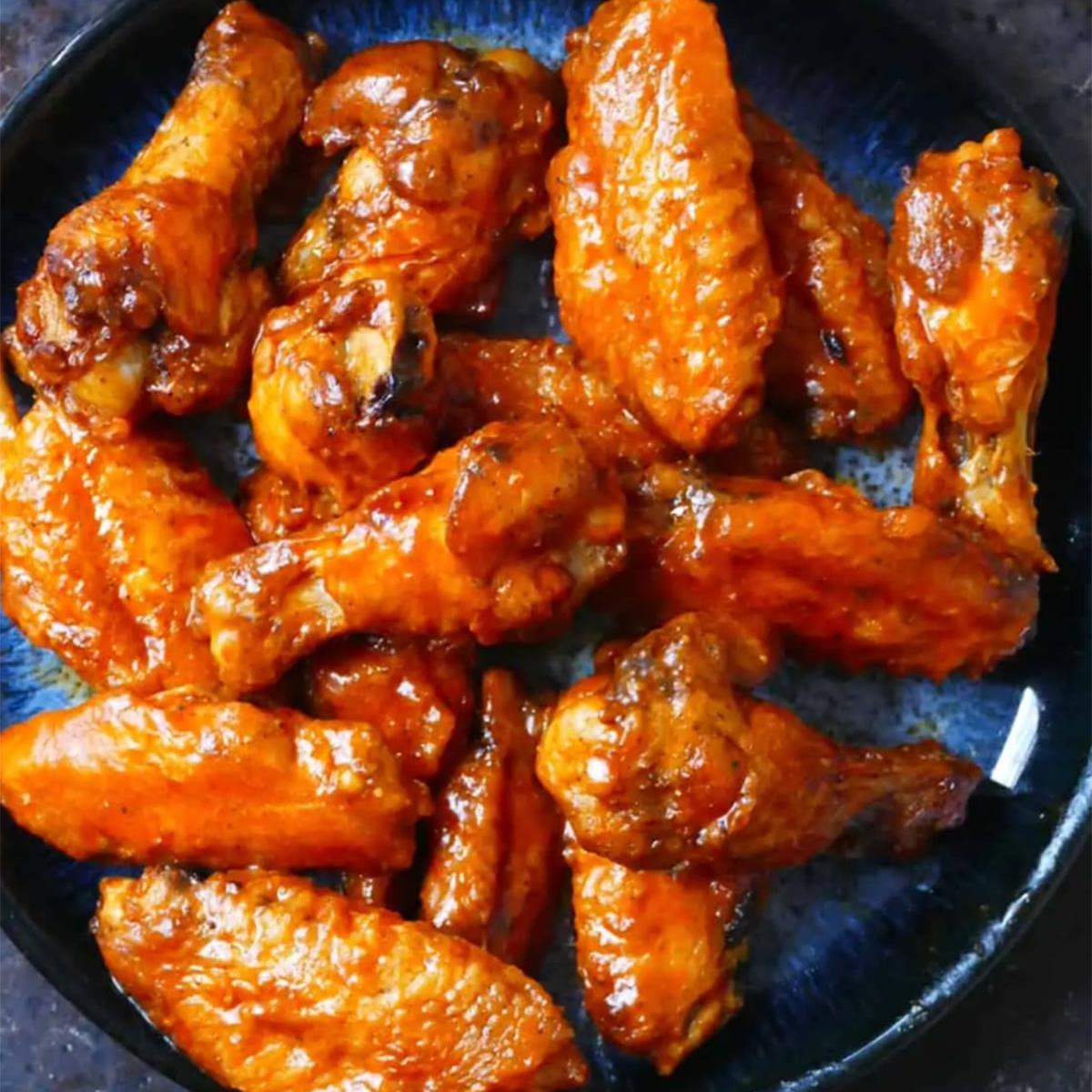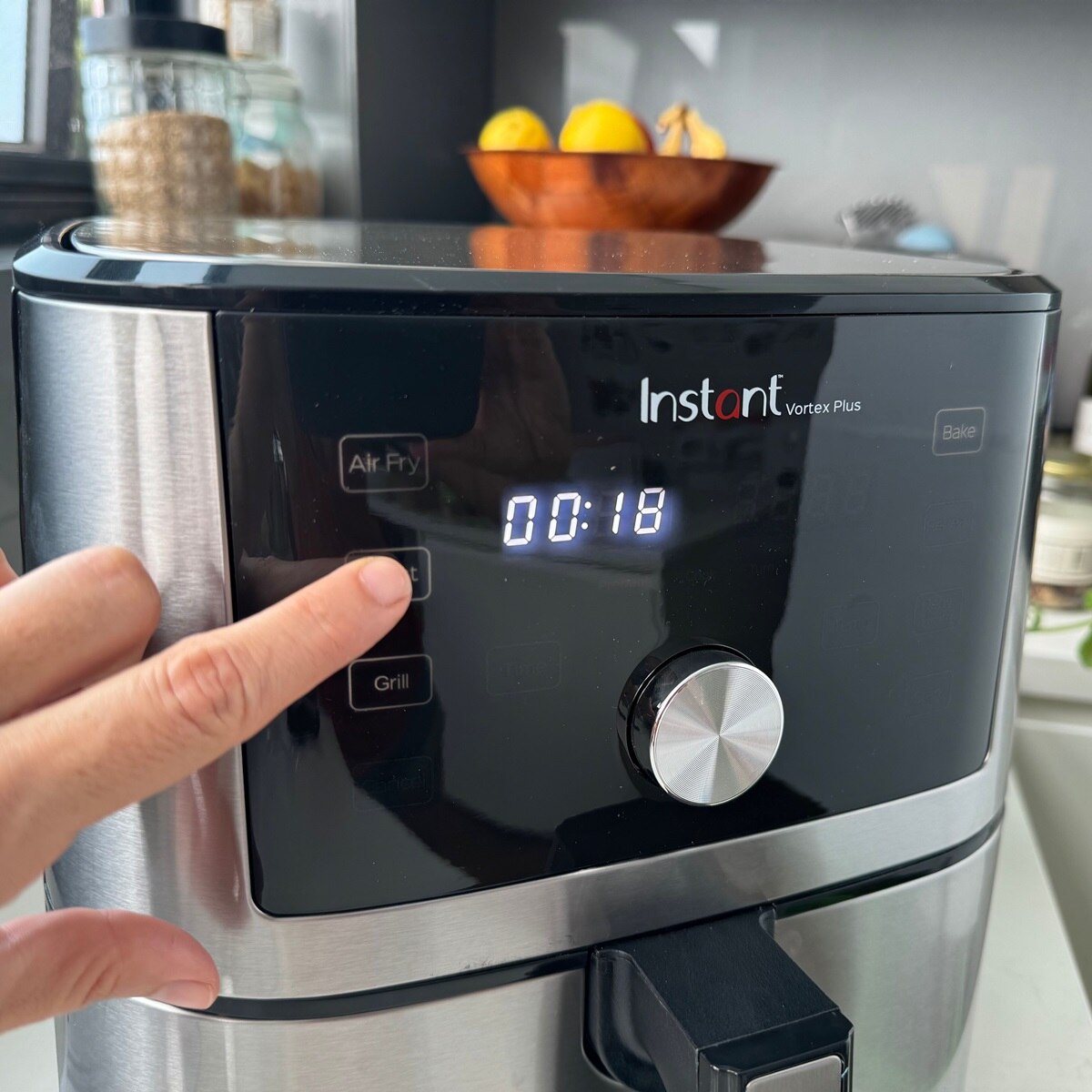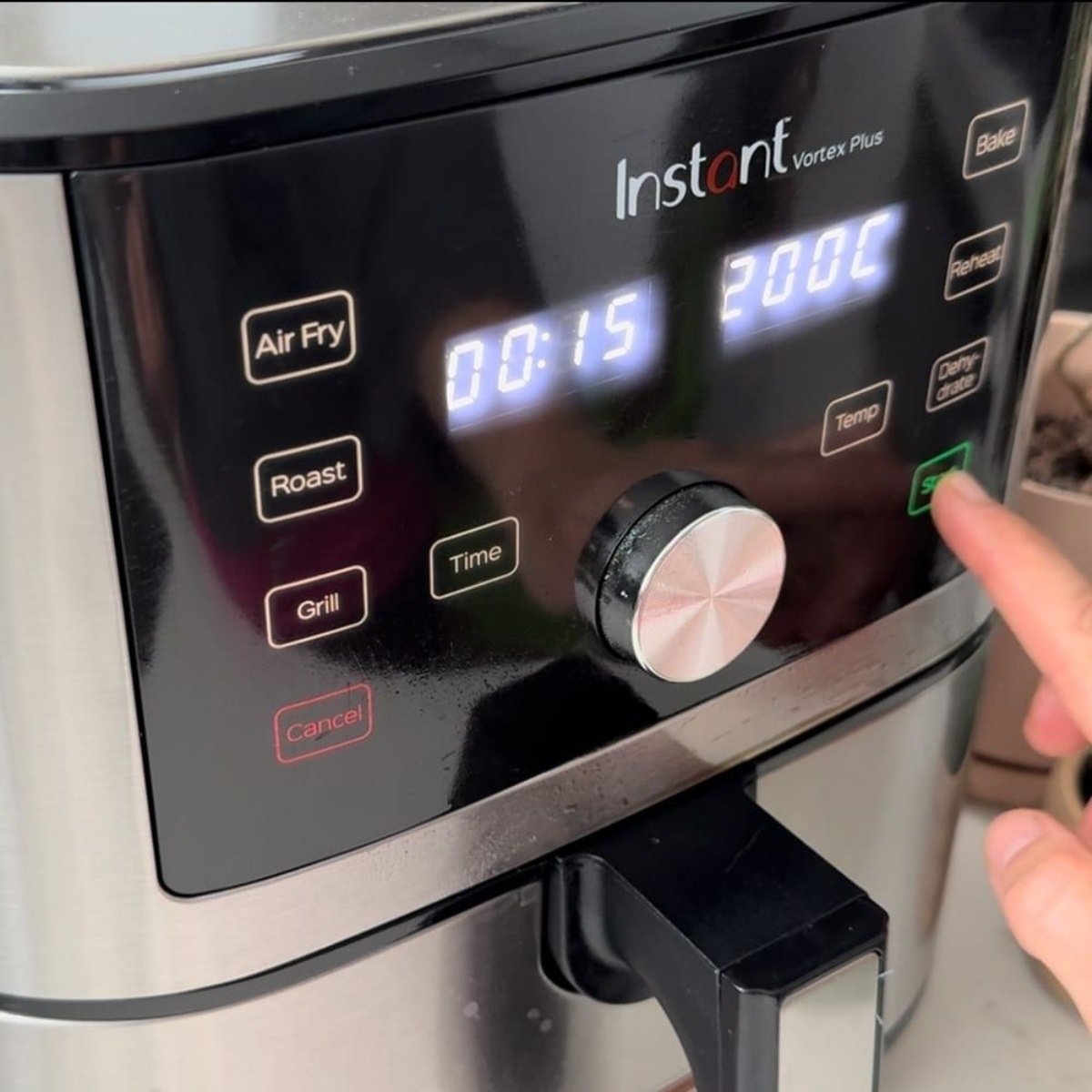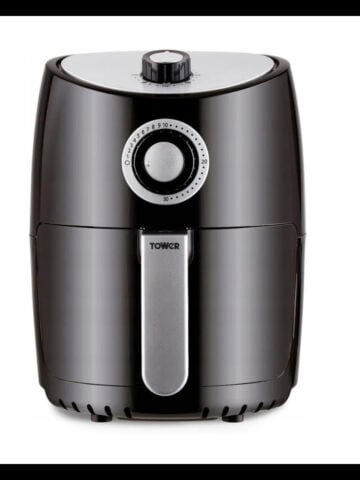
Air fryers are a popular appliance found in many kitchens. But lately, there’s been a lot of chatter about whether these kitchen appliances are as safe as we thought. Are air fryers toxic? It’s a question that’s been buzzing around, and it’s time we took a closer look.
I’ve been using air fryers for years, and I’ll admit, I was skeptical at first. But after countless batches of crispy fries and juicy chicken wings, I’ve become a convert. Still, I couldn’t ignore the growing concerns about the safety of air fried food, especially with discussions about the formation of acrylamide and the potential accumulation of PFAS chemicals.
So I decided to dive deep into the research and separate fact from fiction. Take a look below:
Jump to:
- The Air Fryer Revolution: Healthy or Hype?
- The Acrylamide Issue: A Cause for Concern?
- The Temperature Factor: Finding the Sweet Spot
- The Non-Stick Dilemma: PFOA and PTFE
- Air Fryer Safety: Beyond the Chemicals
- Making the Most of Your Air Fryer: Tips for Safe and Healthy Cooking
- The Bigger Picture: Air Fryers in a Balanced Diet
- FAQs about are air fryers toxic
- Conclusion
The Air Fryer Revolution: Healthy or Hype?
Air fryers promise the crispy, delicious taste of fried food with a fraction of the oil. It sounds almost too good to be true, right? Well, in many ways, it’s not just hype.
These gadgets use hot air circulation to cook food, which can significantly reduce the amount of oil needed. A study in the Journal of Food Science found that air frying can cut down on oil absorption by up to 90% compared to traditional deep frying.
That’s a huge difference, especially when you consider that 100 grams of deep-fried chicken breast contains a whopping 13.2 grams of fat, while an oven-roasted version has just 0.39 grams.
But less oil doesn’t automatically mean healthier. Air fry methods also reduce the formation of acrylamide in food, a potential carcinogen. There’s more to the story, and that’s where things get interesting. Could air fryers be contributing to health problems, or are they just the latest trend in kitchen appliances?
The Acrylamide Issue: A Cause for Concern?

One of the main concerns about air fryers is the potential formation of acrylamide, a compound that forms in some foods when cooked at high temperatures. The International Agency for Research on Cancer classifies acrylamide as “probably carcinogenic to humans.”
But here’s the thing: acrylamide isn’t unique to air fryers. It can form in any high-heat cooking method, including baking, roasting, and yes, even deep frying. In fact, air frying might actually be a better option in this regard. Many air fryer users are unaware of this fact.
A 2015 study in the Journal of Food Science found that air frying can lower acrylamide content by up to 90% compared to deep frying. That’s a significant reduction. Air frying food not only reduces acrylamide content but also offers convenience and safety benefits.
However, it’s important to note that acrylamide can still form in air-fried foods, especially starchy ones like potatoes. The key is in how you use your air fryer.
Related: How Do I Prevent Acrylamide in My Air Fryer: Key Tips
The Temperature Factor: Finding the Sweet Spot

Temperature plays a crucial role in acrylamide formation. According to Poison Control, acrylamide can start forming when foods are heated to 250°F (121°C). Most air fryers can reach temperatures well above this.
But here's where it gets interesting. Dietitian Megan Hilbert from Top Nutrition Coaching points out that the real danger zone is above 500°F (260°C). That's when some of the more troubling chemicals can start to break down.
Luckily, most air fryers don't go above 450°F (232°C). So as long as you're using your air fryer as intended, you're likely in the clear. But it's always a good idea to keep an eye on your food and avoid overcooking to minimize any potential health risks.
The Non-Stick Dilemma: PFOA and PTFE
Another concern about air fryers is the non-stick coating used in many models. Some people worry about chemicals like PFOA (Perfluorooctanoic Acid) and PTFE (Polytetrafluoroethylene), better known as Teflon.
The good news is that since 2013, all Teflon products have been PFOA-free. But if you’re still concerned, there are alternatives. Some of the best air fryers, like the Paris-Rhone 5.3QT air fryer and the Ninja AF161 Max XL, use ceramic coatings or stainless steel baskets instead of non-stick materials. For a healthier option when cooking bacon, consider using an air fryer with a ceramic coating.
For example, the Paris-Rhone 5.3QT air fryer uses a ceramic coating, which is free from ‘forever chemicals’ like PFOA and PTFE. This makes it a popular choice among health-conscious consumers who are looking for safer alternatives to traditional non-stick cookware. Ceramic-coated air fryers offer a good time in the kitchen with delicious results.
Related: Which Air Fryers Are BPA Free: Top 5 Safe Choices
Air Fryer Safety: Beyond the Chemicals
While we've focused a lot on potential chemical concerns, it's worth noting that there are other safety factors to consider with air fryers. In recent years, there have been several product recalls due to fire and burn hazards. These incidents raise concerns about the overall safety of these appliances.
For instance, in March 2024, Insignia air fryers were recalled due to potential fire, burn, and laceration hazards. These recalls serve as a reminder to always follow the manufacturer's instructions and keep an eye on your appliance while it's in use.
They also highlight the importance of choosing reputable brands and models with a good safety track record.
Also read: Power XL Vs Emeril Air Fryer: Which One To Choose?
Making the Most of Your Air Fryer: Tips for Safe and Healthy Cooking

So, are air fryers actually toxic? The short answer is: not inherently, but like any cooking method, it’s all about how you use them. Here are some tips to make the most of your air fryer while minimizing any potential risks:
- Don’t overcook your food. This can lead to increased acrylamide formation, especially in starchy foods.
- Avoid cooking at extremely high temperatures. Stick to the recommended settings for your recipes.
- Use the right amount of oil. While air fryers need less oil, a light coating can help prevent food from drying out.
- Choose your air fryer wisely. Look for models with ceramic coatings or stainless steel baskets if you’re concerned about non-stick chemicals.
- Keep your air fryer clean. Regular cleaning can prevent the buildup of food particles that could burn and create harmful compounds called poly-fluoroalkyl substances.
- Be cautious when cooking foods at high temperatures. This can produce smoke and other potentially harmful chemicals. Use high smoke point oils and avoid rough tools that could damage non-stick coatings.
- Use your air fryer safely when cooking foods such as eggs and cheese on toast to avoid harmful chemicals.
The Bigger Picture: Air Fryers in a Balanced Diet
While it's important to consider the potential risks of any cooking method, it's equally crucial to look at the bigger picture. Air fryers can be a valuable tool in creating a healthier diet, especially if they're helping you cut down on deep-fried foods. They can be a great alternative to deep fryers while still achieving a crispy texture.
Remember, 40 percent of the potatoes consumed in America come from frozen products, like french fries. If air frying can help reduce the fat content of these popular foods, that's a significant win for public health. This shift towards healthier cooking methods can have a positive impact on overall well-being.
Moreover, air fryers can make it easier to incorporate more vegetables into your diet. From crispy Brussels sprouts to perfectly roasted carrots, these appliances can make veggies more appealing to even the pickiest eaters. This can lead to a more balanced and nutrient-rich diet for individuals and families alike.
Check out this: Which Air Fryer Causes Cancer? Myths, Facts, and Healthy Tips.
FAQs about are air fryers toxic
Air fryer ovens operate similarly to standard air fryers and pose no additional risks if it uses non-toxic materials and proper cooking practices are followed.
No, air fryers do not emit harmful radiation. They work by circulating hot air around the food, similar to a convection oven. The heat is generated by electrical elements, not radiation.
The confusion might arise from the term "air frying," but it's not related to any form of radiation cooking. Air fryers are safe to use and do not pose any radiation-related health risks.
Most foods are safe to cook in an air fryer. However, cooking starchy foods like potato chips at lower temperatures can reduce the formation of potentially harmful chemicals.
Avoid using metal utensils that can scratch the surface, and do not overheat the air fryer. Rather use heat-resistant silicone utensils. Choose air fryers with non-toxic coatings to avoid exposure to harmful chemicals.
Yes, ceramic or stainless steel air fryers are considered safer as they do not release harmful chemicals and are more durable than traditional non-stick coatings.
Conclusion
So, are air fryers toxic? The evidence suggests that when used correctly, air fryers are not inherently toxic. In fact, they can be a healthier alternative to traditional deep frying. The key is in how you use them.
Like any cooking method, air frying comes with its own set of considerations. But with proper use and a bit of knowledge, you can minimize any potential risks while enjoying the benefits of air frying. The process starts with understanding how air fryers work and the potential risks involved.
Remember, no single appliance or cooking method is a magic bullet for health. Air fryers can be a great tool in your kitchen arsenal, but they're just one part of a balanced, varied diet. As always, moderation and variety are key to a healthy lifestyle.
So go ahead, enjoy that air-fried chicken or those crispy sweet potato fries. Just remember to keep an eye on the temperature, avoid overcooking, and maybe throw in some air-fried veggies while you're at it. Your taste buds - and your health - will thank you!










Leave a Reply